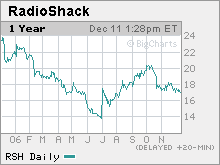 We know, we know. What the heck is a dog of a stock like RadioShack doing among Fortune's top picks? We had our doubts too when Bob Olstein - a fund manager obsessed with quality of earnings and good corporate governance - touted RadioShack as his favorite stock for 2007. "The next J.C. Penney," he called it. Not unlike Penney in the late 1990s, RadioShack has been a basket case of late, doing little to update its stores even as it lost market share to Best Buy and other retail rivals. RadioShack's earnings have been cut in half since 2000, and its stock price has shrunk 75 percent. To top it all off, CEO David Edmondson was forced to resign last February after it was revealed that he had fabricated parts of his résumé. The failure to vet Edmondson's credentials was a huge embarrassment for RadioShack's directors, but they redeemed themselves in choosing his replacement, retail industry veteran Julian Day. Kmart's CEO during its turnaround, Day came onboard in July, and Olstein - whose Olstein Funds owns 1 percent of RadioShack - sees early signs of progress, noting that debt, inventories and accounts receivable are all coming down.
We know, we know. What the heck is a dog of a stock like RadioShack doing among Fortune's top picks? We had our doubts too when Bob Olstein - a fund manager obsessed with quality of earnings and good corporate governance - touted RadioShack as his favorite stock for 2007. "The next J.C. Penney," he called it. Not unlike Penney in the late 1990s, RadioShack has been a basket case of late, doing little to update its stores even as it lost market share to Best Buy and other retail rivals. RadioShack's earnings have been cut in half since 2000, and its stock price has shrunk 75 percent. To top it all off, CEO David Edmondson was forced to resign last February after it was revealed that he had fabricated parts of his résumé. The failure to vet Edmondson's credentials was a huge embarrassment for RadioShack's directors, but they redeemed themselves in choosing his replacement, retail industry veteran Julian Day. Kmart's CEO during its turnaround, Day came onboard in July, and Olstein - whose Olstein Funds owns 1 percent of RadioShack - sees early signs of progress, noting that debt, inventories and accounts receivable are all coming down.Given Day's reputation as a shrewd cost cutter - at Kmart he turned a $5 million quarterly loss into a $155 million profit in one year - Olstein believes RadioShack can grow earnings from a projected 73 cents a share this year to $2 or more by 2008 or 2009. Apply a market multiple to $2 a share in earnings, and you get $35 - double the current stock price. And RadioShack is the kind of fixer-upper private-equity firms love to buy.
Day hasn't said much publicly about his plans, but Kaufman Brothers analyst SooAnn Roberts says that beyond closing less profitable stores and trimming payroll, it's clear what RadioShack needs to do: reduce the clutter, improve customer service, and scrap oddball electronics like metal detectors and CB radios to create more shelf space for what's hot. Roberts thinks the turnaround is doable, although she's the only analyst who rates RadioShack a buy. As for Olstein, he recalls that nobody liked J.C. Penney either when he started buying it in 2002 at $20 a share. Four years later he'd quadrupled his investment.
